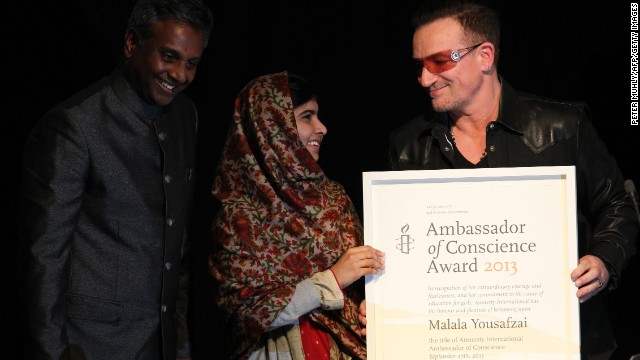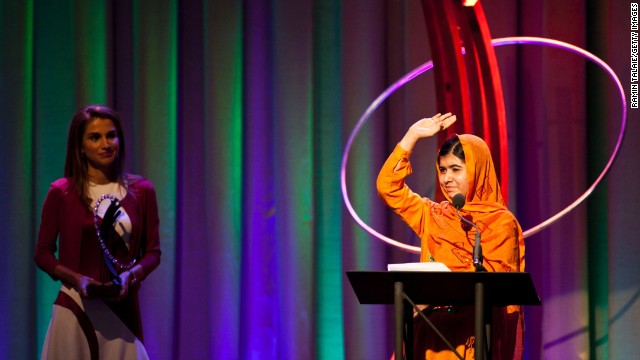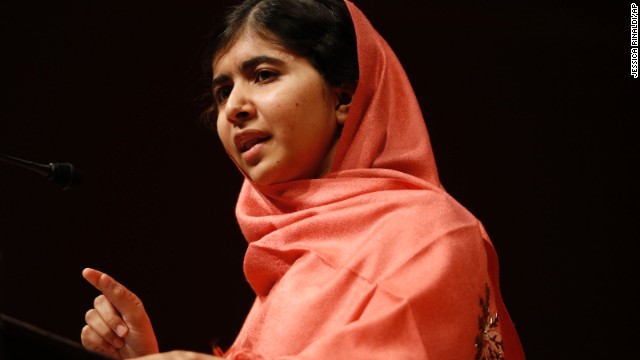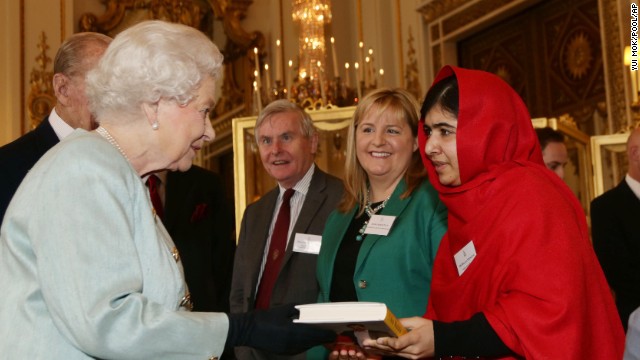 Malala Yousafzai, 16, poses for a photo in London on October 3. She stared death in the face in 2012 when a Taliban gunman shot her in the head on her way home from school in Pakistan. Since then, she has become a global voice for girls' education in Pakistan.
Malala Yousafzai, 16, poses for a photo in London on October 3. She stared death in the face in 2012 when a Taliban gunman shot her in the head on her way home from school in Pakistan. Since then, she has become a global voice for girls' education in Pakistan.  Pakistani hospital workers carry Malala on a stretcher on October 9, 2012, after she was shot in the head and neck by the Taliban in Mingora, Pakistan.
Pakistani hospital workers carry Malala on a stretcher on October 9, 2012, after she was shot in the head and neck by the Taliban in Mingora, Pakistan.  Malala recovers after receiving treatment at Queen Elizabeth Hospital in Birmingham, England, on October 19, 2012. Doctors covered the large hole in her skull with a titanium plate. The teen suffered no major brain or nerve damage and has kept the piece of her skull that was removed as a souvenir of her fight.
Malala recovers after receiving treatment at Queen Elizabeth Hospital in Birmingham, England, on October 19, 2012. Doctors covered the large hole in her skull with a titanium plate. The teen suffered no major brain or nerve damage and has kept the piece of her skull that was removed as a souvenir of her fight.  Malala talks with her father, Ziauddin, at the Queen Elizabeth Hospital. In Pakistan's Swat Valley, Malala fought for girls' rights to have an education. Girls were banned from schools in the Swat Valley in 2009. Malala anonymously blogged for the BBC in opposition to that order, drawing the Islamist militants' rage.
Malala talks with her father, Ziauddin, at the Queen Elizabeth Hospital. In Pakistan's Swat Valley, Malala fought for girls' rights to have an education. Girls were banned from schools in the Swat Valley in 2009. Malala anonymously blogged for the BBC in opposition to that order, drawing the Islamist militants' rage.  The teen was discharged from the hospital in January to continue her rehabilitation at her family's home.
The teen was discharged from the hospital in January to continue her rehabilitation at her family's home.  Malala returns to school at Edgbaston High School for Girls in Birmingham, England, on March 19. She said she had "achieved her dream."
Malala returns to school at Edgbaston High School for Girls in Birmingham, England, on March 19. She said she had "achieved her dream."  Malala was one of seven people featured on the cover of Time magazine's 100 most influential people edition in April. New threats by the Taliban surfaced on Monday, October 7. The Taliban have denied targeting her for promoting education for girls.
Malala was one of seven people featured on the cover of Time magazine's 100 most influential people edition in April. New threats by the Taliban surfaced on Monday, October 7. The Taliban have denied targeting her for promoting education for girls.  Malala is applauded before she speaks at the United Nations Youth Assembly in New York City on July 12, her 16th birthday. "They thought that the bullets would silence us, but they failed," she said. "And then, out of that silence, came thousands of voices."
Malala is applauded before she speaks at the United Nations Youth Assembly in New York City on July 12, her 16th birthday. "They thought that the bullets would silence us, but they failed," she said. "And then, out of that silence, came thousands of voices."  The teen receives the XXV International Prize of Catalonia award in Barcelona, Spain, on July 26. The prize recognizes those who have contributed to the development of cultural, scientific and human values around the world.
The teen receives the XXV International Prize of Catalonia award in Barcelona, Spain, on July 26. The prize recognizes those who have contributed to the development of cultural, scientific and human values around the world.  Malala receives a trophy from Yemeni civil rights activist and 2011 Nobel Peace Prize winner Tawakkul Karman after being honored with the International Children's Peace Prize in the Hague, Netherlands, on September 6.
Malala receives a trophy from Yemeni civil rights activist and 2011 Nobel Peace Prize winner Tawakkul Karman after being honored with the International Children's Peace Prize in the Hague, Netherlands, on September 6.  Musician Bono and Secretary General of Amnesty International Salil Shetty honor the teen with the Amnesty International Ambassador of Conscience Award for 2013 at the Manison House in Dublin, Ireland, on September 17. The award is Amnesty International's highest honor, recognizing individuals who have promoted and enhanced the cause of human rights.
Musician Bono and Secretary General of Amnesty International Salil Shetty honor the teen with the Amnesty International Ambassador of Conscience Award for 2013 at the Manison House in Dublin, Ireland, on September 17. The award is Amnesty International's highest honor, recognizing individuals who have promoted and enhanced the cause of human rights.  Queen of Jordan Rania Al Abdullah presents the Leadership in Civil Society award to Malala at the Clinton Global Citizen Award ceremony in New York City on September 25.
Queen of Jordan Rania Al Abdullah presents the Leadership in Civil Society award to Malala at the Clinton Global Citizen Award ceremony in New York City on September 25.  Malala addresses students and faculty of Harvard University in Cambridge, Massachusetts, after receiving the 2013 Peter J. Gomes Humanitarian Award on September 27.
Malala addresses students and faculty of Harvard University in Cambridge, Massachusetts, after receiving the 2013 Peter J. Gomes Humanitarian Award on September 27.  A man arranges Malala's memoir, 'I Am Malala' at a bookstore in Ahmedabad, India, on October 9. The book marks the anniversary of her shooting, it follows her journey from near-death to global fame.
A man arranges Malala's memoir, 'I Am Malala' at a bookstore in Ahmedabad, India, on October 9. The book marks the anniversary of her shooting, it follows her journey from near-death to global fame.  Malala gives a copy of her book to Britain's Queen Elizabeth II during a reception for youth, education and the commonwealth at Buckingham Palace in London on Friday, October 18.
Malala gives a copy of her book to Britain's Queen Elizabeth II during a reception for youth, education and the commonwealth at Buckingham Palace in London on Friday, October 18.
- Malala Yousafzai is an outspoken advocate for the education of girls
- The suspects are linked to the Pakistan Taliban, Pakistani army says
- Malala recently visited Nigeria in support of the girls kidnapped by Boko Haram
Islamabad, Pakistan (CNN) -- Pakistani security forces arrested 10 people in the attempt to kill teen activist Malala Yousafzai, the army said Friday.
An outspoken supporter of a girl's right to an education in Pakistan, Malala was despised by Taliban militants who opposed her assertive initiative because they didn't want girls to go to school. In October 2012, an Islamist militant shot Malala, then 15, in the head as she was traveling home on a school bus.
She survived after emergency surgery in Pakistan and further treatment in Birmingham, England. The attack left two others injured.
Her bravery and determination generated support for her ordeal and knowledge about the plight of girls across the world who can't get a formal education.
 Who is Malala Yousafzai?
Who is Malala Yousafzai? Authorities in Pakistan said the people involved in the attack were linked to the Pakistan Taliban and were taking orders from its leader, Mullah Fazlullah.
The suspects were arrested in Swat, a district of Khyber Pakhtunkhwa province, army spokesman Maj. Gen. Asim Bajwa said. Malala, now 17, was born in the Swat city of Mingora.
Speaking at a press conference in Rawalpindi, Bajwa said that after an initial arrest "we were able to track down the entire gang," known as Shura. All of them are residents of Malakand, also a district in Khyber Pakhtunkhwa.
Pakistan's Malala: Global symbol, but still just a kid
An activist for years
Malala's activism began in the Swat region in 2009. Despite Taliban threats and pronouncements, she kept going to school and speaking out for education, and she wrote an anonymous blog for the BBC about her harrowing experiences. The Taliban came by on house raids, and she had to hide her books.
She received national and international honors for her efforts.
 The schoolgirl who took on the Taliban
The schoolgirl who took on the Taliban But, according to the Malala Fund website, "her increased profile and strident criticism of the Taliban caused Taliban leaders to meet, and in 2012 they voted to kill her."
The Taliban, which claimed responsibility for the assault, said Malala was "a symbol of the infidels and obscenity." But the Malala Fund noted that other Muslim clerics in Pakistan "issued a fatwa against the Taliban leaders and said there was no religious justification for shooting a schoolgirl."
The organization supports projects in Pakistan, Kenya, Jordan, and Nigeria.
Malala at U.N.: The Taliban failed to silence us
Malala's appeal: 'Stop misusing the name of Islam'
 Malala meets missing girls' families
Malala meets missing girls' families This summer, Malala visited Nigeria and appealed to Boko Haram militants in Nigeria to lay down their weapons and "stop misusing the name of Islam."
Boko Haram, the name of which roughly translates as "Western education is a sin" in the local Hausa language, is trying to impose Sharia law across Nigeria and especially opposes the education of women.
She made the trip in support of an estimated 276 girls kidnapped in April by Boko Haram from their school in Chibok in northeastern Nigeria.
Malala was a favorite for the Nobel Peace Prize
CNN's Joe Sterling reported and wrote from Atlanta. Journalist Adeel Raja reported from Islamabad.
No comments:
Post a Comment